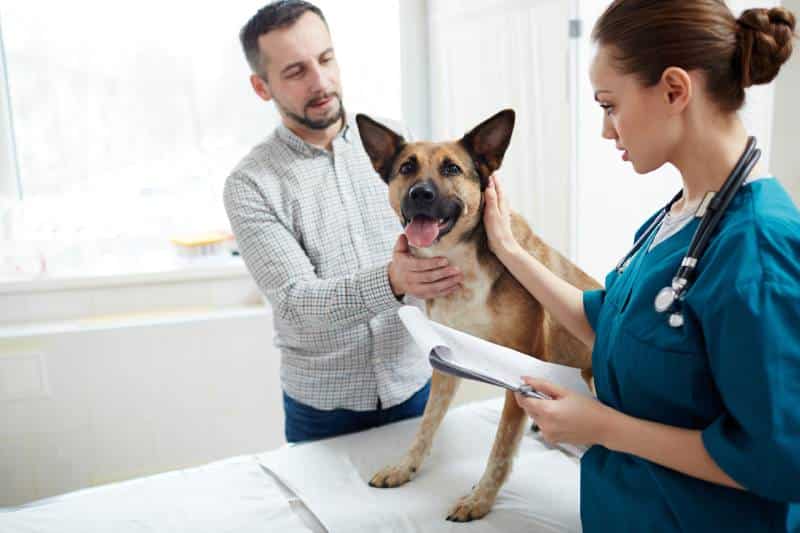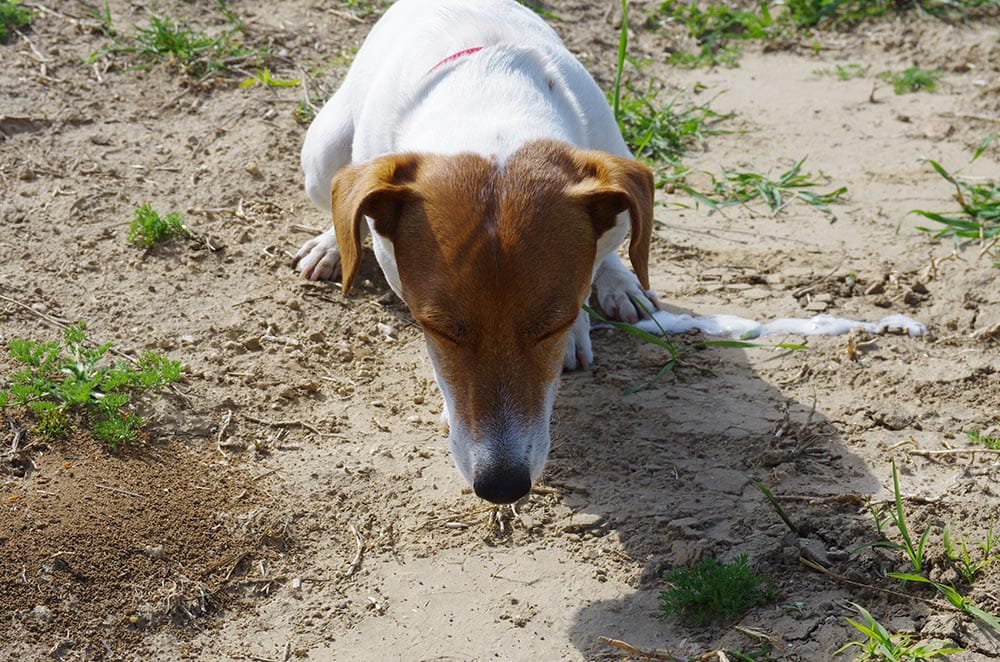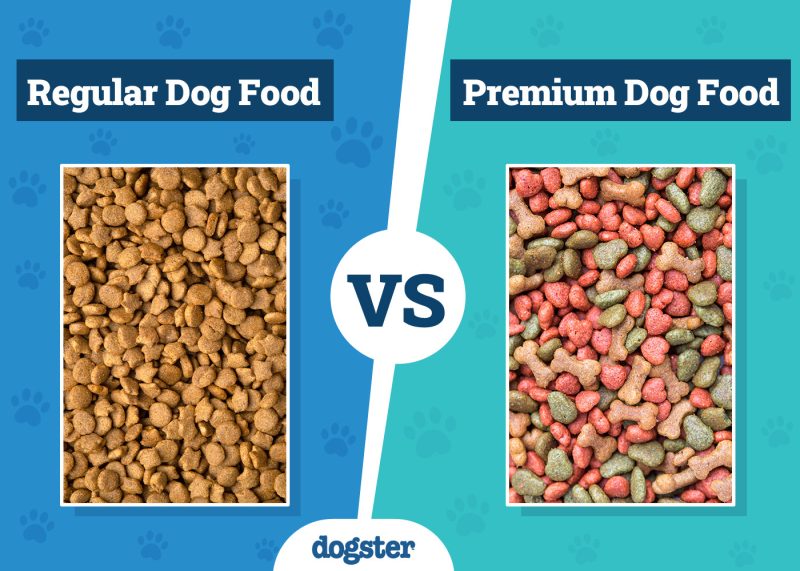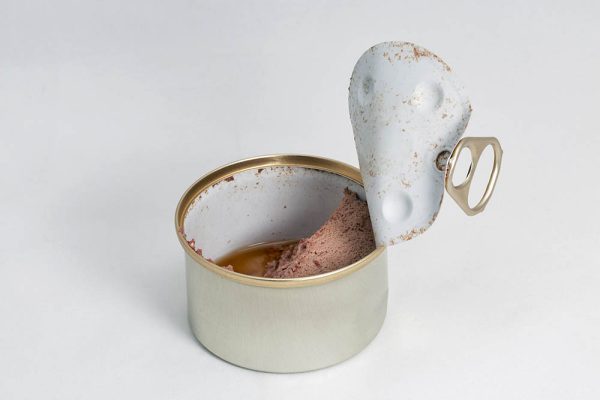It is always alarming for any owner to see their dog vomit. If there is blood present, this can be even more stressful. If you find yourself in this situation, it is important to stay as calm as possible and act quickly to do everything to help your dog.
This article will discuss exactly what you need to do if you see your dog vomiting blood and advise you of the possible causes.

My Dog is Vomiting Blood, What Do I Do Now?
Follow this step-by-step guide if you see your dog vomiting blood.
1. Ensure Your Dog is Safe
Make a quick assessment of your dog’s surroundings. Is there anything dangerous that they may have eaten or ingested that may be causing them to vomit blood? Check that all cleaning products are out of reach and that there have not been any spillages. Remove anything that may cause them further harm or that they might try and eat.
Examine your dog. If they will tolerate it, briefly try to check the inside of their mouth to see if there is anything lodged in there. Keep a close eye on your dog and make sure they do not eat anything else that may cause them any harm.

2. Get in Contact with Your Vet
Keep your dog under supervision and get on the phone with your vet. If there have been any hazardous substances they may have had access to, keep the bottle or packaging handy. If there has been any food stolen or anything else missing from your dog’s environment take note and make sure to tell your vet. Your vet will need to gather as much information as possible to try and determine exactly what has happened. Try to stay as calm as possible.
Questions your vet may ask you will include:
- When did the vomiting start?
- How frequently is your dog vomiting?
- What does the vomit look like? Is there fresh red blood present? Is there dark brown-colored blood? Is the vomit mixed with food?
- Has your dog brought anything else up such as bile or hair?
- Has your dog had any diarrhea?
- Has your dog had a recent cough or any breathing difficulties?
- Is your dog eating well?
- Is your dog drinking normally?
- Have there been any recent changes in their energy levels?
- Has your dog been exposed to any known toxins or other harmful substances such as cleaning products?
- Has your dog recently been injured or suffered any trauma?
- Is your dog currently on any medications?
- Is your dog up to date with their vaccinations?
- Does your dog have any medical conditions?
- What breed is your dog?
- How old is your dog?
- Has your dog had a history of vomiting?
A vet will be able to advise you on the best course of action to ensure the well-being of your pet.
If you need to speak with a vet but can't get to one, head over to PangoVet. It's an online service where you can talk to a vet online and get the personalized advice you need for your pet — all at an affordable price!
3. Follow Your Vet’s Instructions
Your vet will likely ask for you to bring your dog down to the practice to be examined. If this is the case, you need to bring them down as soon as possible. Sometimes they will ask if you can take a picture of the vomit or bring them a sample.

4. Do Not Attempt to Treat Your Dog at Home
If your dog is vomiting blood, especially if this is the first time it has occurred, it is never recommended to treat them at home. There may be a very serious cause for the vomit with blood in and they may require urgent veterinary attention.
Only a veterinary professional can administer the appropriate treatment. Some home remedies for vomiting can end up doing more harm than good.
5. Keep a Close Eye on Your Dog
Monitor your dog and do not let them out of your sight. As mentioned above there could be something seriously wrong with them and they may show more clinical signs of illness at any moment. You cannot look after them properly if you are not with them.

Causes of Throwing Up Blood in Dogs
Many things cause or contribute to vomiting with blood in it. Some are mild and transient; others are more severe and can be fatal.
Causes may include:
- Dietary indiscretion: If your dog has eaten something they shouldn’t have such as leftovers from the garbage, foreign objects, or toxic plants, this can cause irritation and make them vomit blood.
- Gastritis: Inflammation of the lining of the stomach can cause bleeding and vomiting with blood.
- Parasites: Intestinal parasites, especially hookworms, can cause irritation and damage to the lining of the gastrointestinal tract. This can result in vomiting with blood.
- Stress/anxiety: Depending on the cause of the stress, this can result in damage to the lining of the gastrointestinal tract, and cause vomiting with blood present.
- Gastrointestinal ulcers: Ulcers are open sores that form on the surface of the stomach or intestines. They often bleed and cause vomiting.
- Trauma/injuries: Any sort of injury that causes damage to the abdomen area can result in internal bleeding, some of which can be vomited up if it is in the gastrointestinal tract. Perforating injuries from foreign bodies can cause damage and vomiting of blood, for example, if a sharp object is swallowed.
- Infections: Various infectious organisms cause gastrointestinal bleeding and vomiting including bacteria and viruses
- Intestinal blockage: Anything that causes a blockage of the intestines can cause vomiting with blood present. This can include tumors, foreign bodies, twisted or strangulated guts, and intussusception.
- Cancer: Tumors in the digestive tract often cause bleeding and vomiting.
- Liver and kidney disease: Both of these conditions can cause internal bleeding and vomiting of blood.
- Clotting disorders: Blood clotting disorders can lead to spontaneous bleeding. This can be in the gastrointestinal tract.
- Medications: Certain types of drugs and medications can irritate the lining of the guts and cause bleeding. Some of this blood may be vomited up.
- Toxins/poisonous substances: Some chemicals and toxins can cause internal bleeding and vomiting. This can be very harmful if the substance causes damage to the lining of the gastrointestinal tract, as when it is vomited back up, it comes into contact with the esophagus again and causes even more damage.
What Will Your Vet Do?
When you arrive at your vet clinic, your vet will likely carry out a thorough physical exam and take a clinical history from you. They will need to run some routine blood tests to look at blood cell counts and organ function, and also specific blood tests that assess clotting abilities. A urine sample may be useful too.
X-rays and ultrasound scans can be used to assess internal structures. Endoscopy can also be used to examine the gastrointestinal tract. Accurate diagnosis is vital to determine the most appropriate course of treatment.
Treatment options include:
- Dietary changes and bland food, which are especially useful if there is only minor irritation.
- Medications for ulcers such as H2 receptor antagonists, (famotidine) and proton pump inhibitors (omeprazole).
- Antiparasitic medications are indicated if there is a parasite infection.
- Antibiotics will be used if there is a bacterial infection present.
- Surgery may be indicated for intestinal blockages, foreign bodies, injuries, and ulcers.
- Supportive care in the form of intravenous fluid therapy, pain relief, and in severe cases blood transfusions.

How to Prevent Vomiting of Blood in Dogs
Depending on the underlying cause of the vomiting, it may not be possible to prevent it. However, in many cases, there are lots of precautionary measures that can be taken.
- Regular vet checkups and ensuring your dog is up to date with their annual vaccinations.
- Regular parasite control using products prescribed by your vet.
- Feeding a healthy balanced diet and avoiding feeding table scraps.
- Preventing your dog from scavenging on walks or out of bins.
- Keeping cleaning products locked away in the home.
- Prompt attention to changes in behavior or clinical signs of illness.

Frequently Asked Questions (FAQ)
How soon should I take my dog to the vet if they are throwing up blood?
If you see your dog throwing up blood, you should take them to your vet immediately. It may turn out that there is nothing seriously wrong with your dog, however, there could be a life-threatening problem. It is always best to have your vet check your dog over to put your mind at rest.
Can a dog survive after vomiting blood?
Many of the conditions that cause vomiting with blood in can be easily treated and the chances of your dog making a full recovery are good. Some other conditions such as cancer or liver disease require surgical intervention or long-term management strategies and hold a poorer prognosis.
Why is my dog vomiting blood but acting normally?
Some causes of vomiting with blood are caused by simple things like dietary indiscretion. Your dog may not be systemically unwell or have an underlying health condition. They may seem fine in themselves and not show any signs of illness apart from the throwing up. It is always best to still get your dog checked out regardless as they may go on to develop clinical signs that mean something more serious is happening.

In Conclusion
Finding blood in your dog’s vomit can be a very distressing experience. There are many different reasons blood may appear. Some are due to mild issues that either resolve on their own or need minimal management. Some are due to serious health complications and require aggressive surgical treatment.
It is always advised to take your dog to the vet to have them checked out if they are throwing up blood. There is no way of telling if something is seriously wrong at home and it is always better to be safe than sorry. Whatever the underlying issue may be, by taking action quickly and seeking veterinary attention, you will be increasing your dog’s chances of a full recovery.
Featured Image Credit: Enrico Spetrino, Shutterstock



















